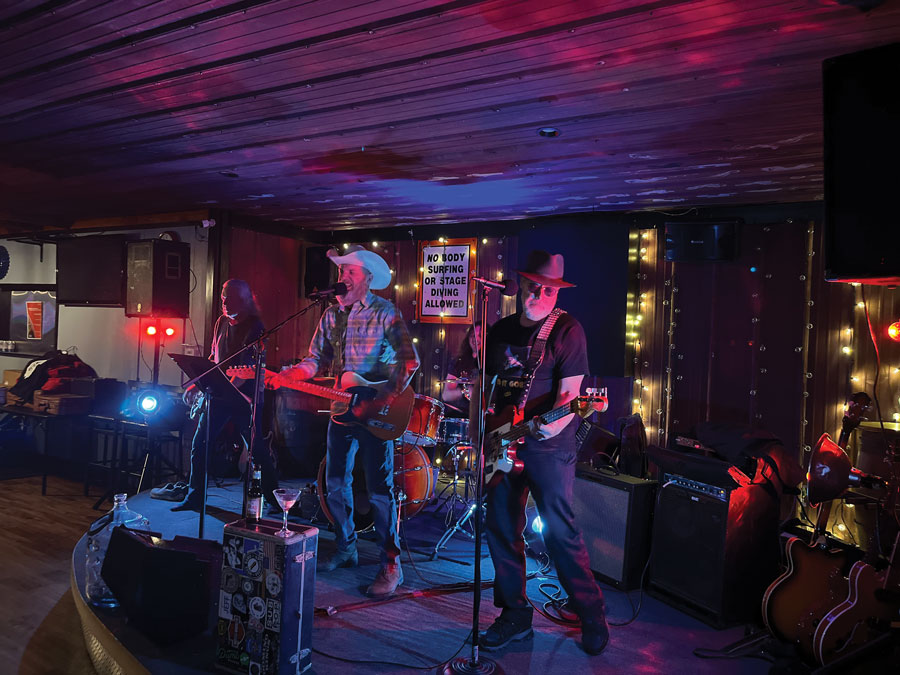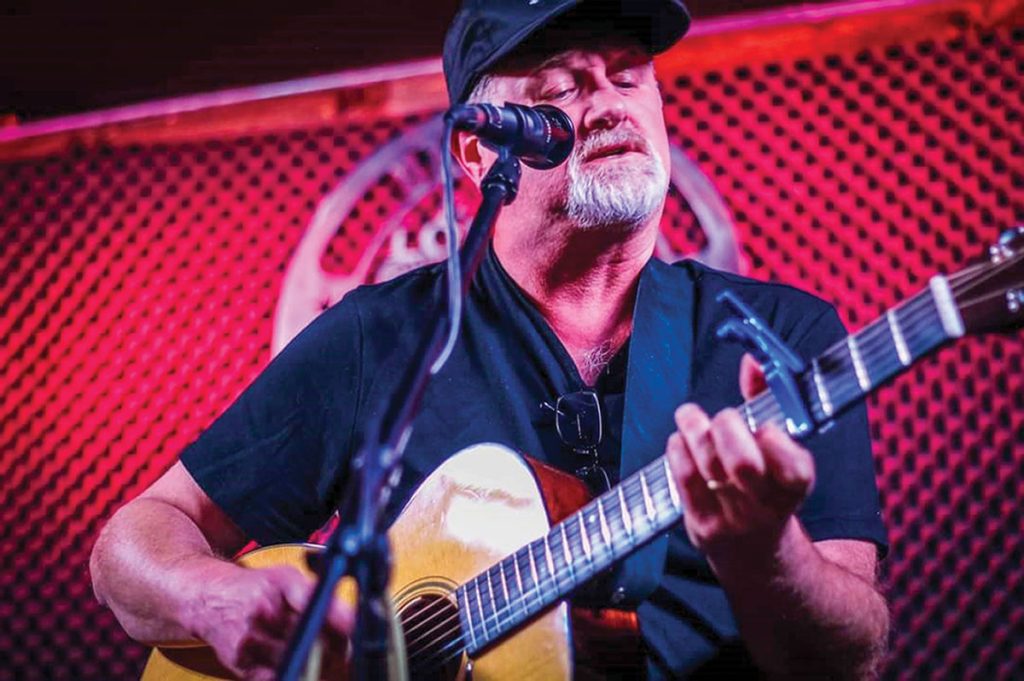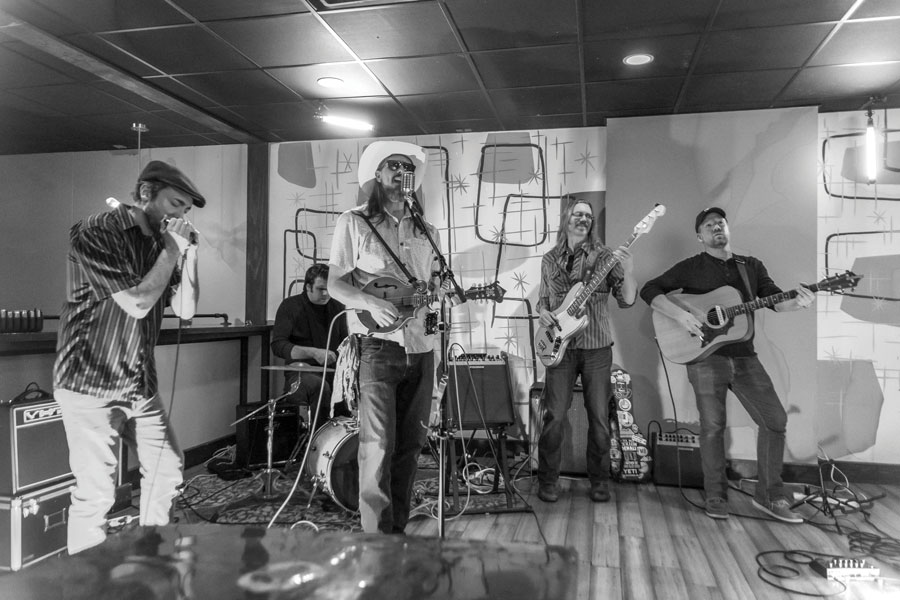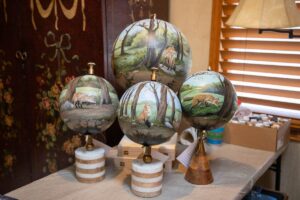A network of local bands and songwriters buzzes just below the surface of Illinois’ capital city and its surrounding towns. Digging a little deeper to find them yields some surprising results — original music of all genres, hitmakers behind the scenes of the music industry and a passionate desire to write and perform in the heartland.
• Wolf Crick Boys
Menard Electric Cooperative member Greg Patterson fronts honky tonk rock band Wolf Crick Boys. Patterson pens the group’s songs and performs them with his signature gritty lead vocals, augmented by the rock-inspired guitar licks of the often sock-footed Tom “Dooley” Woolsey. Enigmatic bassist Keith Ramey and hard-hitting Patrick Miller on skins (drums) together lay down a solid backend that drives the music. Patterson says the group’s sound has evolved over its 25 years.
“You’ve got everyone’s influences coming together. I’ve been playing in bands since I was 15. I’ve played in every kind of band you can possibly imagine,” says Patterson. “I’m an open book when it comes to music, as long as it’s good. If it touches you in some way, it doesn’t matter the genre.”

Patterson, who grew up in Riverton, named the band after a creek in his hometown, though he made one small tweak. “A bunch of my family is from Missouri and Kentucky, and they never said creek. They said crick,” he says. “I always thought that was funny when I was a kid.”
Many of his songs have an autobiographical element. “I go through phases where I like some better than others. There are songs I haven’t played in years that we might pull out of the ‘vault,’ which is a cardboard box in my closet in the band room. Everything I’ve ever written is in that box,” he says. With a laugh, he admits a lot of it has yet to see a live audience.
Patterson says the band members congregate regularly. “We get together once a week, no matter how much we’re playing. We play music and have a meal together. Mostly we joke around; sometimes there’s a lot more smoking and joking than playing music,” he says. “We’re honestly like a family. [You] have to feel that connection with someone musically and on a deeper level.”
• The Backroom Lounge
The group often plays Jeb Brown’s Backroom Lounge, a “listening room” located in the back of a party store in Riverton. “Jeb and I go way back,” says Patterson. “I started Wolf Crick Boys and he started promoting music right around the same time. We’ve been working together ever since.”
“[Wolf Crick Boys] are the only guys who have like a residency here,” says Brown. “They play at least once a month.” Brown hosts a myriad of musical guests in the intimate, 50-seat, pew-lined room, including prolific singer/songwriters originally from Illinois.
“We still work with Lyman Ellerman — he’s been with us since the start. He’s a singer/songwriter originally from Riverton. We’re blessed to still be working with [him] and Kendell Marvel,” says Brown. “Kendell, he’s written No. 1 songs, but he’s from southern Illinois and still plays this little room. We just sold him out twice.” Brown says the venue averages 150 shows a year.
“[We] have been around when some really big songs have been written in the backroom, [when] we’ve done songwriter retreats,” he says. “We’re proud of that as well.”
Brown says Jeb Brown Productions began in 1999. “This is my 24th season of [being] an original singer/songwriter [promoting] music. For more than 25 years, I’ve done big festivals all the way down to what I’m doing now,” he explains.
Brown says that there aren’t many people doing ticketed shows like these for independent artists. “That’s what sets us apart,” he says.
Ellerman believes what Backroom Lounge is doing is important. Longtime friends of Brown and his dad, the Nashville songwriter says new audience members quickly get a sense of what the room is all about. “I think people are longing for something they can connect to, that’s real. … The venue lends itself to listening. It’s just an intimate place where the song gets heard,” he says. “There are not a lot of venues like this out there. I’ve been fortunate to play some of them. Ironically enough, a lot of them seem to be in the Midwest.”

• Lyman Ellerman
Ellerman started playing as a kid in Riverton, which eventually turned into a prolific songwriting career, though music wasn’t always at the forefront. “I played the central Illinois bar circuit for a good while, and with a lot of folks in Springfield and surrounding areas,” he says, adding that it was later in life in another state when “friends of friends” heard some of what he was writing and introduced him to someone in the business. “That sparked quite a bit of interest, so that was what got me back into it. … Let’s just say I’ve been fortunate.”
He describes his writing as organic. “It’s usually things I’ve experienced with other people or watching other people, just the nature of being human. That’s basically what I tend to write about,” he says. “I’ve always looked at melody and lyrics like a marriage — they’ve got to complement each other.”
As he matured as a musician, his appreciation of music grew beyond just the good time commonly associated with performing covers, he says, adding that Brown’s venue fosters that higher level experience.
“The focus is on the music at a place like that. … And for that to be out of Riverton … that’s fantastic. Just goes to show there is room for it in this community and probably most communities. Sometimes it just takes somebody like Jeb,” Ellerman says. “It’s almost an introspective place, which is counterintuitive, and there’s a variety of folks that wander in and out. That’s good … it means he’s able to give those people more exposure.”
• Tom Irwin

Singer/songwriter Tom Irwin has been a part of the central Illinois music scene most of his adult life. His work as a contributing music writer for the Illinois Times since 2000 has strengthened his relationships with other songwriters and bands in the area.
He mentions Wolf Crick’s Tom Woolsey, who he met as a child. “He was (from) the next farm over. We became friends [when] we were about 12, and we still are. In fact, my oldest son Owen plays with [him] in a band.” He says people often ask him about the group, which is aptly named Owen & Dooley Present:. “I tell them, that’s my son, and that’s my best friend,” he says.
“We have played on and off together for years,” Irwin says of Woolsey, adding that he’s known Wolf Crick’s Patterson for a long time as well. “I’ve known Greg when he used to play drums all the time, and he started playing guitar. It’s a nice history of people around here playing music.”
Irwin and Ellerman are also friends. “We wrote a couple of songs and did some songwriter rounds together in Nashville,” he says.
“I always thought of myself as a writer more than anything. … The more I played my own stuff, the more people started to ask about it. … If you want to play your own music, you’ve got to just go do it,” he says. “I’ve never really played a lot of cover songs. My joke always was that I couldn’t learn anybody else. I had to write my own.”
By the late 1980s, Irwin developed more of a folk style, writing stories about his great uncle who lived in Salisbury and tales his grandma told him. “My influences [came] from other writers who decided to stay where they were and wrote about the community they lived in and their family, and connections like that,” he explains.
He wrote “Sangamon Songs,” which he and his sons perform together, based on a diary he found in his family’s farmhouse in rural Pleasant Plains. “[The diary] was written in 1893 by a young boy who lived in the same house where I grew up,” he says.

• Square of the Roots
Brian Steinhauer, songwriter and lead singer of the band Square of the Roots, describes his band’s sound as Americana. “It’s had a few different flags over the years. I’ve been doing it long enough to remember when it was alternative country, and then it became Americana. It’s a mix of country, blues and folk music.”
The band has performed in the past with Wolf Crick Boys and has also appeared at Backroom Lounge.
“You find yourself playing in interesting places, [like] the MVP Happy Holler in Newton, Ill. It’s right on the Embarras River,” Steinhauer says. The venue, complete with a wandering potbellied pig and resident rooster, boasts an original stage from an ’80s Farm Aid concert. “To say you played on the same stage as Tom Petty and Willie Nelson is pretty cool,” he adds.
Steinhauer’s father recently “retired” from his full-time position with the band. “I’m a product of my old man,” says Steinhauer.
“I started playing shows by myself, and I’d have my dad join me. We came up with the name because it was roots-based music with country, blues and bluegrass,” he says. Later came a bass player and drummer, and eventually, another guitarist, allowing Steinhauer to incorporate the mandolin.
A multi-instrumentalist, he does most of the songwriting. “I write the songs, and we shape our arrangement of it [together]. … That is fun to do together as a band,” says Steinhauer. “My whole process is just going back and forth from different instruments with different musical ideas. It takes on a whole other life.”
The band is working on a new album. Their debut video, “Sister Georgia,” inspired by Steinhauer’s sister, can be seen on YouTube.
“There’s so much to it to get a great studio quality recording where you can hear the nuances of the bass and the percussion and the mandolin, and the harmonies and the vocals,” he says. “It’s nice to be able to play all the different sides of the emotions.”

• Wayward Motel
Josh Catalano of Wayward Motel admits he was a late bloomer when it came to rock music, and that concert and jazz genres were more his focus growing up. In college, he picked up the guitar. “I never dreamt about being in a band. It was more [about] having fun,” he says. “But my buddy, Patrick Miller (also of Wolf Crick Boys), who’s a drummer in my band and now has been a bandmate of mine for years, convinced me that we should play some music. … We’ve been playing in a band ever since.”
The group plays a couple of times a month at local Springfield venues, and Catalano likes it that way. “I toured in my younger days, and I don’t want to spend weeks at a time in a van,” he says. “Now I want to just make and record music and play it when I can.
“We use synthesizers, but we also like country licks. We do a little bit of everything. I wouldn’t say we’re Americana, and we’re not heavy. We’re not alternative. I don’t know what that term means anymore,” he laughs. “We’re just American music.”
The band’s latest release, “Beauty Queen,” came out in March. The album will be released this summer.
“I like to write a big hook. When I find [one] I like, I write around it,” he says. “But I can’t write a song twice. … I [may] want to write something like it again, but I can never do it, because I don’t know where they come from. … For the most part, it just happens.”
• Happy to be homegrown
Fame and fortune aren’t always the driving force behind the desire to create music. “You can stay in your own community, and you can have a career and a life of writing and performing your own music,” says Irwin.
To listeners, he adds, “Take a chance [and] go listen to a band that you’ve never heard before. … Spend $15 [to buy their CD] and then listen to it. … Move beyond the things you already know. Find something new. You might like it. And you might not like it. That’s OK. At least you tried it.”
As Ellerman says, “Good music will be found.”
“It’s out there,” says Patterson. “You just have to look for it.”










